Had a great, mellow week at work. Had a few lunches, talked to some bankers, and my understanding of the world improved. Finally finished the David Geffen book, and will start reading the train book that my boss gave me. Oma and Opa went to Hong Kong on Thursday, we’ll miss them, but I have already heard from them, and they’re having a great time.
Here are some pics from Wednesday:
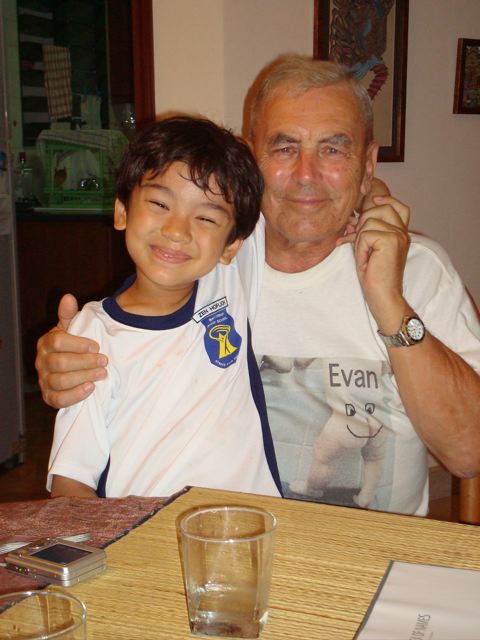
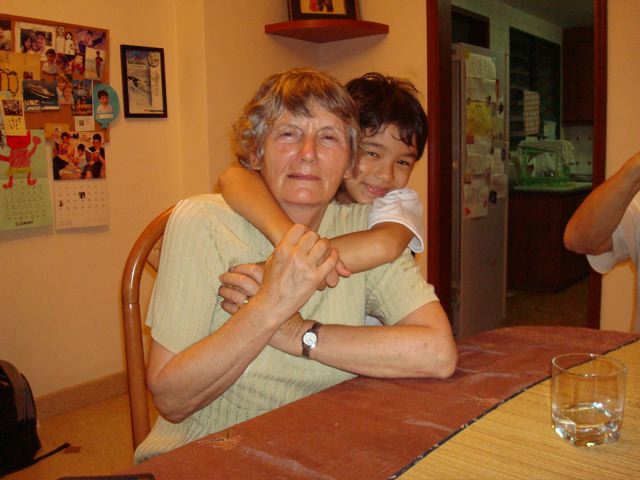
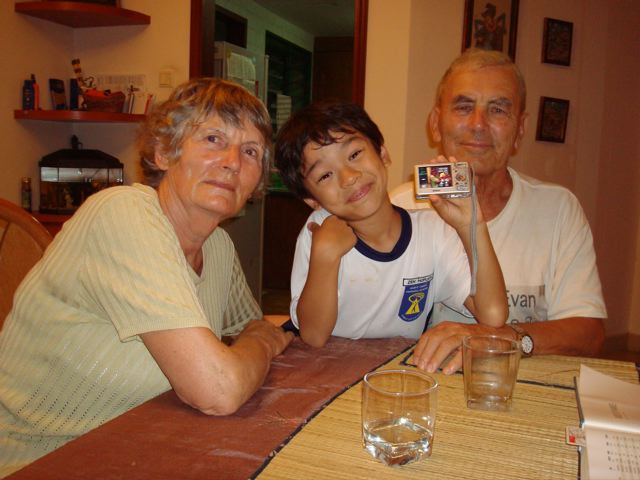
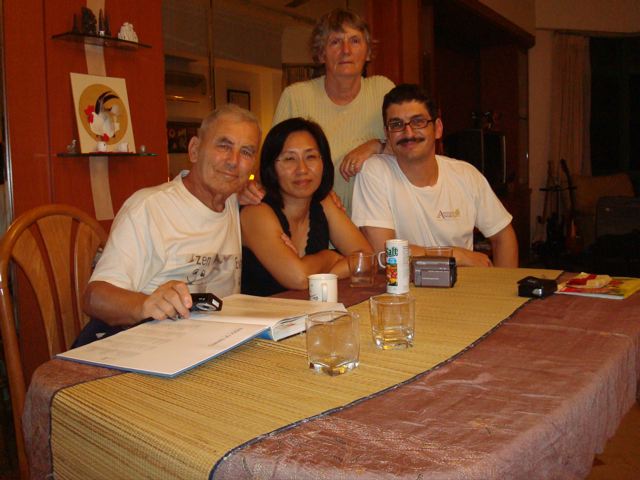
DVD review:

Robert Plant and Jimmy Page – No Quarter/Unledded: From the offset, this is probably the least impressive Led Zeppelin product that I own. Opening scenes are of scenery and nature, eagles crying, rivers; then, at the top of a waterfall, there appear Robert Plant and Jimmy Page performing “No Quarter.” Robert looks okay – a little old, perhaps – but Jimmy is sprawled out in a suit that looks an acre wide, and were it not for the trademark hair he would seems more like the ghost of Peter Grant than Jimmy Page. But despite all of the mock enchantment, the song seems a bit naked without the monster drums and riffs. I’m disappointed, of course – it’s one of Led Zeppelin’s best songs and probably the most drastically underestimated composition in their playbook, and they lost the opportunity to make an impact; on top of all this, it’s also a song that John Paul Jones had a large part in (so much so that it becomes the track in The Song Remains The Same that was incorporated with Jones’ fantasy sequence), which makes his non-inclusion in a project named after one of his main songs a bit of a tacky decision on the part of Robert and Jimmy.
From this slow start, the video switches to a live stage setting and the band goes into a great version of “Thank You” and the painful “What Is And What Should Never Be.” Seeing Robert and Jimmy onstage with a drummer who is not John Bonham (and who is the bass player who is NOT John Paul Jones?) is a bit odd, but you get over it soon when you hear the cornucopia of North African musicians who are playing along with them. Great, great, great. The drummer does a fine job, playing “Four Sticks” with four drumsticks (two in each hand), and other drum jams bare-handed. Besides Robert and Jimmy, the band has Charlie Jones (Robert Plant’s son-in-law) on bass, and Porl Thomson, formerly of the Cure, on guitar.
One of the surprises of the set was when the band played “The Battle of Evermore” with Najma Akhtar, an Indian singer, doing the part sung by the late Sandy Denny of Fairport Convention – it works, partially because you can’t be sure if she’s singing in English or another language. A few of the songs are performed on a hill with Welsh musicians, giving “Nobody’s Fault But Mine” an amazing Celtic feeling (probably the reworked number that turns out the best). Present at the filming is an actual black dog.
Jimmy played a couple of shiny new Les Pauls, but also a double-neck Ovation as well as a weird custom-made three-neck object (6-string, 12-string, mandolin). With these heavy instruments, he’s often seated. This adds to the appearance that he is in poor health, although for some songs when he does get up and swing the Ovation around it looks pretty awkward – maybe it’s better that he stay seated. Like The Song Remains The Same, the camera lingers perhaps a bit too long on Robert Plant… but since he is by far the most dynamic person onstage, I guess it doesn’t make sense to complain too much about this point.
One interesting thing about the DVD is that it contains songs that don’t appear on other Led Zeppelin DVDs, songs such as “Thank You”, “The Battle of Evermore,” “Gallows Pole,” “When the Levee Breaks,” “The Rain Song”, “Four Sticks”, and “Friends”. There are also some cool new songs. “City Don’t Cry” features Robert and Jimmy jamming with four Moroccan musicians in a courtyard; “The Truth Explodes” is done MTV-style (“Where The Streets Have No Name” perhaps?) in a Moroccan parking lot with some amps, and lots of local people of all ages having a great time. “Wah Wah” is more courtyard folk drone, the Moroccan musicians sing along too. “Wonderful One” is probably the best of the new songs, it’s very soulful and beautiful. Besides the disappointing “No Quarter”, another song that disappointed was “When the Levee Breaks”, which was remarkably tuneless. Others were much better: “Since I’ve Been Loving You” was so good that Jimmy cheered up and gave a big baby-faced grin (finally – it was only 58 minutes into the 93-minute video); “Rain Song” with Jimmy’s acoustic guitar and a full orchestra was lush and beautiful; and “Four Sticks” with the Moroccan orchestra and the snake charmer flute was great, the song is truly amenable to Eastern rhythms and the musicians don’t feel tacked on here the way they do on some songs. “Kashmir” was… all right, nothing special. They messed around with it a bit, giving it a quiet intro before getting into the two monster riffs that dominate the song. Nice Moroccan rock ‘n’ roll reprise at the end, which included a bit of “Rock ‘n’ Roll”.
The DVD has four extras, including an interview with Robert and Jimmy on a traffic island in London that mirrors a bit the interview between Robert and Peter Grant in The Song Remains The Same extras. Porl Thompson seems to be the interviewer (which would mean it was quite scripted), but I may be wrong. Robert is expressive, but Jimmy stutters a bit and doesn’t seem confident. They point out that “Since I’ve Been Loving You” is their best live song, and the evidence on Unledded seems to back this up (the song appears on all three of their DVD releases). “Moroccan Montage” is just that, a delightful series of video scenes from Morocco of the guys hanging out with people. “Black Dog” was performed at the ABC American Music Awards, it’s energetic but a bit cheezy as well – check out Robert’s “captain” jacket. They also tack on the video for “Most High” from Robert and Jimmy’s poorly-received “Walking into Clarksdale” (1998), a song which wasn’t performed on Unledded. The video is a by-the-numbers spooky freak show that is sort of a blend of Heironymous Bosch (see also Metallica’s “Until It Sleeps” video of 1994) and the Sadako scenes in Nakata Hideo’s 1998 Ring movie. Not something you’d expect two music legends to be happy to have their names associated with.
Book review:
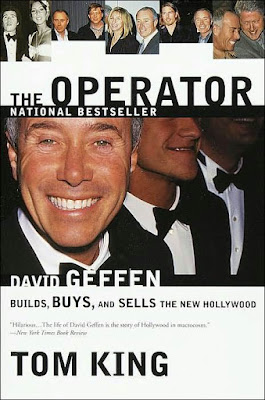
“The Operator: David Geffen Builds, Buys, and Sells the New Hollywood”, by Tom King – The story of Hollywood’s richest, most influential man, is a very interesting read. It also includes one of the most interesting introductions that I’ve ever read (when is an introduction ever interesting?) in the way it recounts the author’s challenges in even writing the book, by showing how David Geffen veered from being very supportative of the book to withdrawing all support, something which becomes a well-recognized pattern in Geffen’s life (as described by King, at least) and a thesis for the book itself. The book goes back to Geffen’s grandparents, but spends more time with his parents – where they came from, how they met, and how Geffen’s American father brought his Ukranian mother back from Tel Aviv to start a life in New York. The book shifts amazingly to Geffen’s youth, tells stories of his relationship with his brother (which gets cut off eventually), his failed attempts at school, and eventually his rise from the mailroom of a talent agency to the top of the agency, to a record company, to a movie studio, to a media group, and eventually to his foundation of SKG Dreamworks. The story ends in 2000 afte Geffen sold Geffen Records and founded his own media group with Stephen Spielberg and Jeffrey Katzenberg, leaving off as the group struggled to make a profit. Mentioned is American Beauty, which became the first of a string of Oscar-winning films.
The book’s strength is in recounting Geffen’s relationship (sometimes loving, often exceedingly stormy) with hundreds of media executives as well as the actors and musicians that provide material for the entertainment world. Battles, arguments, strategic maneuvers, and lovers quarrels are all recounted, often in an amazing blow-by-blow, word-for-word sequence. Geffen’s temper is legendary, and I get the sense that I’d probably not enjoy a meeting with the man. The book also gets into his philanthropy, and his work with Democrats and the Clintons especially. Rahm Emmanuel is mentioned, I wonder if he’s helping Geffen do more in the Obama administration.
Geffen’s homosexuality is, of course, a large part of the book. Struggling with bisexuality as he searches for a female companion that he can marry, have kids with, and present to the world, but of course also spending his energy on handsome young men as well. Strange how he nearly married Cher.